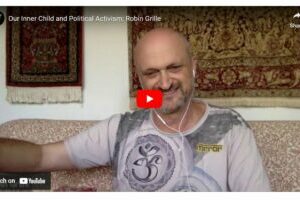From Kindred Media: “Listen to Robin Grille, author of Parenting for a Peaceful World and his latest book, Inner Child Journeys, share insights into how:
1. It’s our inner child who is casting the votes for parenting figures we recognize, according to science.
2. Wounded children are driving the direction of the planet.
3. We create public policy based on our inner child’s unmet needs.”
***
Robin Grille: “A lot of activism tends to be about blame; it tends to be laced with the energy of blame, [the] language [and] the rhetoric of blame, and it’s about tearing down the building. So there’s a lot of attack that happens in activism. But even, you know, the so-called non-violent activism, which is — I’m glad that we’ve made that transition, that marches are peaceful and . . . there’s definitely been, unmistakably, a great movement towards non-physically violent activism in the world, and the thing that we identify as activism, which is usually lots of people out in the street, right. But anger — absolutely there’s a lot to be angry about, but anger and attack and blame are two completely separate things. You know . . . we should be scared — being scared means you’re waking up to what’s going on — and angry; that does not mean attack.
I know for me, I’ve put a lot of energy over my life [into] being mad at corporations, and corporations are bad, or this aspect of capitalism is bad or etc. And if I really pay attention to my voice, I feel like in that mode I’m kind of — I’m a teenager. And really in my body I feel straight away the connection to how I would fight with my father as a teenager. That I so passionately resented his authoritarian ways, his refusal to listen to my side, his imposition of his world view, which felt completely poisonous to me. And so I got caught up in trying to tear down and bring down my dad as the sort of looming male that was blocking out the sunlight for me. And I mean, I’m a little sad about that as I say it because I also love my dad profoundly, and he’s gone now, he’s been gone for about seven or eight years. But that has stayed within me, and I still can almost feel this sort of adolescent pleasure at pointing the finger and saying, ‘Bad.’ And I think that that aspect of activism is undermining; it’s polarizing, it’s exacerbating the polarization of our positions, because people that are identified and associated with that kind of one percent of whatever you want to call that, with the corporations, or the people that seem to be the ‘holders of power’ in our society — they just dig their heels in. They feel persecuted, attacked, they get angry, they fight back, there’s a sort of equal and opposite force that keeps us stuck in this tug of war, you know. It’s not effective. And I do feel like I need to have a different kind of conversation with the inner teenager in me. That it has opened up something else. I’m still angry, but . . . I’m less likely to target individuals, or — I no longer even see the corporation as the source of all evil, you know. It’s become clear to me that the corporation is an expression of us. It’s an expression of us, it’s an expression of me — and I’m keeping that thing alive by fighting it, instead of just putting creative, forceful — forcefully creative energy into creating the new, building the new, the new world that is incompatible with what we have right now that is threatening us with extinction.
. . . It feels important that we bring a loving ear to our own quality of activism: Where is this coming from? You know, am I really the good guy here that is trying to bring down the bad guy, really, or is there something else going on here?
. . . So, everyone’s got their inner child triggered all over the place and we make policy or the lack of policy mostly driven by that.
. . . We’re just full of these reactions, the inner child reactions that make us choose partners, politicians, who to work for, who we fall in love with, and then the head makes a rationale for why we made that choice. That choice was made in the inner child place, most of the time. Is that a little bit chilling? It should be . . . The sooner we come to terms with that, the sooner we can get out of this mess. Because . . . the wounded children are driving the direction of the planet. Wounded children in all of us, the wounded children in the body of an adult who’s not listening to the wounded inner child, let alone the healthy inner child . . . we’re not listening to the child inside at all. That’s why the child, wounded and otherwise, has got control of the airship and is driving it chaotically off the edge of the cliff.”

***
Back to Around the Web











